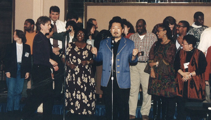 Thank you for leading the frontline response to ending the epidemic. In the past there were battles between community and health departments. Back then community was concerned that health departments did not understand our reality. We had significant differences in strategy and leadership. Over the last 35 plus years, health departments have hired community leaders, so those battles seems like old news. However, plans to end the epidemic could bring those disputes back into select jurisdictions.
Thank you for leading the frontline response to ending the epidemic. In the past there were battles between community and health departments. Back then community was concerned that health departments did not understand our reality. We had significant differences in strategy and leadership. Over the last 35 plus years, health departments have hired community leaders, so those battles seems like old news. However, plans to end the epidemic could bring those disputes back into select jurisdictions.
NMAC is developing guides for health departments and community planning council members that outline key issues to ending the epidemic within communities of color. Staff reassigned or hired to put together local plans should reflect the demographics of the local HIV epidemic. Such representation will also help treat the parallel epidemics of hepatitis and STDs.
This graphic was created by the CDC using 2017 data. It does not include the transgender community, American Indians/Alaska Natives, Pacific Islanders, or Asians. Imagine how the table might look if those communities were at the table. It’s not enough to just look at the demographics of planning council members. NMAC believes equal attention should be paid to professional staff, whether they be internal staff or outside consultants. In fact, hiring consultants may be an effective method if local employment procedures hamper hiring internal staff.
Health departments working to end the HIV epidemic should prioritize hiring people living with HIV, people of color on PrEP, gay men (particularly young gay men of color), the transgender community, black women and Latinas, and former drug users. NMAC believes the messenger is as important as the message. Leadership and staff from the communities hardest hit by HIV greatly increases your plan’s credibility. Nothing against white straight cisgender men, but for this effort, you have a different role to play. As I’ve gotten older, I seem to have lost my tact. Selecting leaders from the communities you need to reach sends a message that you are serious about ending the epidemic.
 To human resource departments: please hire the most qualified person for the jobs. A core qualification is experience working and living in the communities the plan needs to reach. To end the HIV epidemic, we need to reach very specific communities that have unique and varied cultural values. It is not enough to just be culturally sensitive. If you have no transgender staff working at your health department, then how can the transgender community trust your plan to end the HIV epidemic? Outsiders can be seen as opportunists and not a trusted source of information.
To human resource departments: please hire the most qualified person for the jobs. A core qualification is experience working and living in the communities the plan needs to reach. To end the HIV epidemic, we need to reach very specific communities that have unique and varied cultural values. It is not enough to just be culturally sensitive. If you have no transgender staff working at your health department, then how can the transgender community trust your plan to end the HIV epidemic? Outsiders can be seen as opportunists and not a trusted source of information.
 HR needs to understand that they are not hiring a general HIV workforce that anyone can fill. You are looking for people with unique skills. Successful candidates must be able to bring diverse communities to the table to collaborate to build and implement a plan. Too often job descriptions minimize life experience in favor of college degrees. While I have a master’s degree, I will never understand what it means to be a black transgender women living in America and I should never lead or staff a program for them. However, that does not mean I can’t stand in solidarity with transgender community and support their leaders to become the professional staff that our movement needs. If we do this right, ending the epidemic will also be a bridge to professional employment for communities that have experienced generational discrimination.
HR needs to understand that they are not hiring a general HIV workforce that anyone can fill. You are looking for people with unique skills. Successful candidates must be able to bring diverse communities to the table to collaborate to build and implement a plan. Too often job descriptions minimize life experience in favor of college degrees. While I have a master’s degree, I will never understand what it means to be a black transgender women living in America and I should never lead or staff a program for them. However, that does not mean I can’t stand in solidarity with transgender community and support their leaders to become the professional staff that our movement needs. If we do this right, ending the epidemic will also be a bridge to professional employment for communities that have experienced generational discrimination.
It’s time to expand what we mean by qualifications and experience. If HR keeps looking in the same places, it is hard to get different people. Yet without community leaders staffing and leading planning councils, this effort could miss key constituents. Too many failures in the past came from smart educated people who had no understanding of the culture and values of the people highly impacted by HIV. Future e-newsletters will discuss some of the wrong paths that our movement has taken and why we need to employ, train, and build leaders from the communities being targeted.
If we are serious about ending the epidemic, then we have to be real about what that means. Sometimes it takes a friend to say something difficult. You know me, I’ve been with you for the last three decades. I’m not doing this to be difficult, I just want to end the epidemic. That means having difficult conversations. HIV’s history is rooted in difficult questions and overcoming impossible odds.
 To all the white straight cisgender men whom I love, trust me when I say we all have a role to play and yours is to keep the city, county, state, or federal administration happy. As their peers, you are uniquely qualified. In terms of reaching communities that have eluded decades of previous HIV prevention efforts, you have to listen and work with community. We want you by our side, but sometimes community needs to lead. Solutions to end the epidemic need to work with people outside of your usual cultural references, who may or may not share your values or beliefs. The solutions also need to work for decades or until we find the cure. This judgement is left to be said by the oldest queen in the room. The truth will set you free and create the space needed to end the HIV epidemic!
To all the white straight cisgender men whom I love, trust me when I say we all have a role to play and yours is to keep the city, county, state, or federal administration happy. As their peers, you are uniquely qualified. In terms of reaching communities that have eluded decades of previous HIV prevention efforts, you have to listen and work with community. We want you by our side, but sometimes community needs to lead. Solutions to end the epidemic need to work with people outside of your usual cultural references, who may or may not share your values or beliefs. The solutions also need to work for decades or until we find the cure. This judgement is left to be said by the oldest queen in the room. The truth will set you free and create the space needed to end the HIV epidemic!
Yours in the struggle,
Paul Kawata

